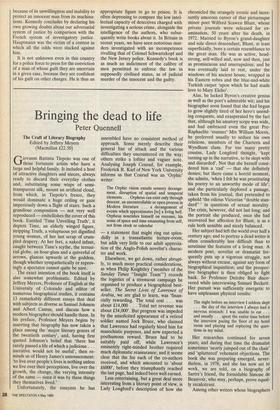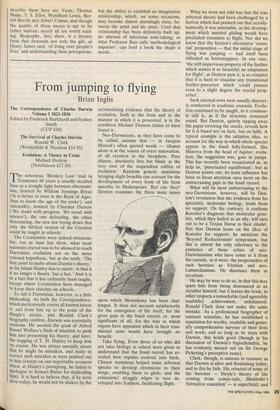Bringing the dead to life
Peter Quennell
The Craft of Literary Biography Edited by Jeffrey Meyers (Macmillan £22.50)
Giovanni Battista Tiepolo was one of V those fortunate artists who have a large and helpful family. It included a host of attractive daughters and nieces, always ready to discard their everyday clothes and, substituting some wisps of semi- transparent silk, mount an artificial cloud, from which, in Tiepolo's fresco, they would dominate a huge ceiling or gaze imperiously down a flight of stairs. Such a grandiose composition — not very well reproduced — embellishes the cover of this book. Entitled 'Time Unveiling Truth', it depicts Time, an elderly winged figure, stripping Truth, a voluptuous yet dignified young woman, of her last scrap of crum- pled drapery. At her feet, a naked infant, caught between Time's scythe, the terrest- rial globe, an hour-glass and a quiverful of arrows, glances upwards at the goddess, though whether sympathetically or reprov- ingly a spectator cannot quite be sure.
The exact intention of the book itself is also somewhat problematic. Edited by Jeffrey Meyers, Professor of English at the University of Colorado and editor of numerous biographical studies, it contains 13 remarkably different essays that deal with subjects as diverse as Samuel Johnson and Albert Camus, and discuss how a modern biographer should handle them. In his preface, Professor Meyers begins by asserting that biography has now taken a place among the 'major literary genres of the twentieth century', and, having first quoted Johnson's belief that 'there has rarely passed a life of which a judicious. . . narrative would not be useful', then re- minds us of Henry James's announcement: `to live over people's lives is nothing unless we live over their perceptions, live over the growth, the change, the varying intensity of the same — since it was by these things they themselves lived.'
Unfortunately, the essayists he has assembled have no consistent method of approach. Some merely describe their general line of attack and the various difficulties they encountered on the way; others strike a loftier and vaguer note. Analysing Joseph Conrad, for example, Frederick R. Karl of New York University informs us that Conrad was an 'Orphic' writer:
The Orphic vision entails sensory derange- ment, disruption of spatial and temporal elements. . . Orpheus can exist only through descent, an uncontrollable or open process in Modern literature . . . a derangement of events which approximates [to] a living hell. Orpheus nourishes himself on recesses, his sense of space and time emanating from self, not from clock or calendar
— a statement that might ring out splen- didly in a transatlantic lecture-room, but adds very little to our adult apprecia- tion of the Anglo-Polish novelist's charac- ter and work.
Elsewhere, we get down, rather abrupt- ly, to much more practical considerations, as when Philip Knightley ('member of the Sunday Times "Insight Team") records the logistics of a strenuous campaign he organised to produce a biographical best- seller. The Secret Lives of Lawrence of Arabia, we are glad to learn, was 'finan- cially rewarding. The total cost . . . was about £14,000 . . . Total net revenue was about £34,000'. But progress was impeded by the unsolicited appearance of a retired soldier named Jock Bruce, who claimed that Lawrence had regularly hired him for masochistic purposes, and now expected a posthumous reward. Bruce had to be suitably paid off; while Lawrence's eminently right-minded brother required much diplomatic reassurance; and it seems clear that the fee each of the co-authors received, and which amounted to 'about L6000', before they triumphantly reached the last page, had indeed been well earned.
Less entertaining, but a great deal more interesting from a literary point of view, is Lady Longford's description of how she chronicled the strangely erratic and inces- santly amorous career of that picturesque minor poet Wilfred Scawen Blunt, whose private journals were released for ex- amination, 50 years after his death, in 1972. Married to Byron's grand-daughter and sole direct descendant, Blunt, at least superficially, bore a certain resemblance to the great man. He was as active, head- strong, self-willed and, now and then, just as promiscuous and unscrupulous; and he was eventually laid to rest, under the windows of his ancient house, wrapped in his Eastern robes and the blue-and-white Turkish carpet 'upon which he had made love to Mary Elcho'.
Alas, he lacked Byron's creative genius as well as the poet's admirable wit; and his biographer soon found that she had begun to grow slightly tired of her hero's unend- ing conquests, and exasperated by the fact that, although his amatory scope was wide, and had embraced even the great Pre- Raphaelite 'stunner' Mrs William Morris, he preferred usually to seduce his own relations, members of the Charteris and Wyndham clans. Far too many pretty cousins, Lady Longford thought, 'kept turning up in the narrative, to be slept with and discarded'. Not that she herself consi- dered him a 'cad' — that she definitely denies; but there came a horrid moment, she admits, 'when I felt he was prostituting his poetry to an unworthy mode of life'; and she particularly deplored a passage, taken from his journal, that pretended to uphold 'the odious Victorian "double stan- dard" ' in questions of sexual morality. The crisis, however, did not last long; and the portrait she produced, once she had recovered her affection for Blunt, is as a rule both sensible and nicely balanced.
Her subject had left the world over half a century ago; and to portray a dead writer is often considerably less difficult than to scrutinise the features of a living man. A modern poet, novelist or dramatist fre- quently puts up a vigorous struggle, not always without excuse, against any form of biographical inquisition; and the prospec- tive biographer is then obliged to fight back. So Professor Deirdre Bair disco- vered while interviewing Samuel Beckett. Her pursuit was sufficiently energetic to have unpleasant physical results:
The night before an interview I seldom slept . . . the day of the interview I always had a nervous stomach: I was unable to eat . . . and usually . . . spent the entire time before the interview pacing the floor of my hotel room and playing and replaying the ques- tions in my mind.
Her researches continued for seven years; and during that time the dramatist sometimes 'nearly jumped out of the chair' and 'spluttered' vehement objections. The book she was preparing emerged, never- theless, in 1978; and she has now set to work, we are told, on a biography of Sartre's friend, the formidable Simone de Beauvoir, who may, perhaps, prove equal- ly recalcitrant.
Among other writers whose biographers describe them here are Yeats, Thomas Mann, T. S. Eliot, Wyndham Lewis, Ber- tolt Brecht and Albert Camus; and though the quality of these essays is apt to be rather uneven, nearly all are worth read- ing. Biography, they show, is a literary form that demands not only the gift, as Henry James said, 'of living over people's lives' and understanding their perceptions, but the ability to establish an imaginative relationship, which, on some occasions, may become almost alarmingly close, be- tween the artist and his sitter. Until that relationship has been definitely built up, no amount of laborious note-taking, or what Professor Bair calls 'methodological inquiries', can lend a book the shape it needs.



















































 Previous page
Previous page